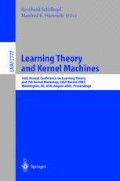Abstract
It is well known in the theory of Kolmogorov complexity that most strings cannot be compressed; more precisely, only exponentially few (Θ(2n − m)) strings of length n can be compressed by m bits. This paper extends the ‘incompressibility’ property of Kolmogorov complexity to the ‘unpredictability’ property of predictive complexity. The ‘unpredictability’ property states that predictive complexity (defined as the loss suffered by a universal prediction algorithm working infinitely long) of most strings is close to a trivial upper bound (the loss suffered by a trivial minimax constant prediction strategy). We show that only exponentially few strings can be successfully predicted and find the base of the exponent.
Access this chapter
Tax calculation will be finalised at checkout
Purchases are for personal use only
Preview
Unable to display preview. Download preview PDF.
References
Cesa-Bianchi, N., Freund, Y., Haussler, D., Helmbold, D.P., Schapire, R.E., Warmuth, M.K.: How to use expert advice. Journal of the ACM 44(3), 427–485 (1997)
Eggleston, H.G.: Convexity. Cambridge University Press, Cambridge (1958)
Gallager, R.G.: Information Theory and Reliable Communication. John Wiley and Sons, Inc., Chichester (1968)
Haussler, D., Kivinen, J., Warmuth, M.K.: Sequential prediction of individual sequences under general loss functions. IEEE Transactions on Information Theory 44(5), 1906–1925 (1998)
Karlin, S., Taylor, H.M.: A First Course in Stochastic Processes. Academic Press, Inc., London (1975)
Li, M., Vitányi, P.: An Introduction to Kolmogorov Complexity and Its Applications, 2nd edn. Springer, New York (1997)
Littlestone, N., Warmuth, M.K.: The weighted majority algorithm. Information and Computation 108, 212–261 (1994)
Vovk, V., Watkins, C.J.H.C.: Universal portfolio selection. In: Proceedings of the 11th Annual Conference on Computational Learning Theory, pp. 12–23 (1998)
V’yugin, V.V.: Algorithmic entropy (complexity) of finite objects and its applications to defining randomness and amount of information. Selecta Mathematica formerly Sovietica 13, 357–389 (1994)
Williams, D.: Probability with Martingales. Cambridge University Press, Cambridge (1991)
Zvonkin, A.K., Levin, L.A.: The complexity of finite objects and the development of the concepts of information and randomness by means of the theory of algorithms. Russian Math. Surveys 25, 83–124 (1970)
Author information
Authors and Affiliations
Editor information
Editors and Affiliations
Rights and permissions
Copyright information
© 2003 Springer-Verlag Berlin Heidelberg
About this paper
Cite this paper
Kalnishkan, Y., Vovk, V., Vyugin, M.V. (2003). How Many Strings Are Easy to Predict?. In: Schölkopf, B., Warmuth, M.K. (eds) Learning Theory and Kernel Machines. Lecture Notes in Computer Science(), vol 2777. Springer, Berlin, Heidelberg. https://doi.org/10.1007/978-3-540-45167-9_38
Download citation
DOI: https://doi.org/10.1007/978-3-540-45167-9_38
Publisher Name: Springer, Berlin, Heidelberg
Print ISBN: 978-3-540-40720-1
Online ISBN: 978-3-540-45167-9
eBook Packages: Springer Book Archive

